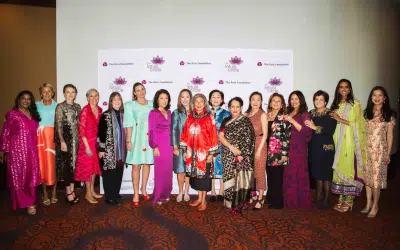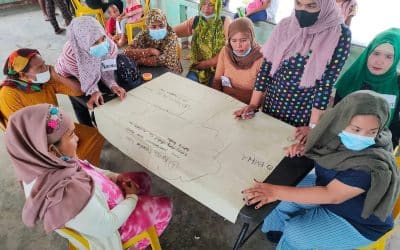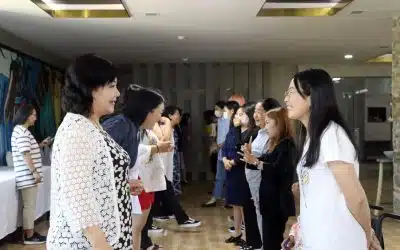InAsia
Insights and Analysis
Care Imperatives for APEC Economies
September 13, 2023

“Unlocking Innovations in the Care Economy,” hosted by The Asia Foundation and USAID. (Photo: U.S. Department of State)
Nearly five years after the adoption of the La Serena Roadmap for Women and Inclusive Growth at the APEC Women and the Economy Forum held in Chile in 2019, the United States hosted the 2023 APEC Women and the Economy Forum in Seattle, Washington, last month. One theme that emerged from the forum was that high-quality, accessible care that provides decent jobs for care workers is necessary to achieve APEC’s commitment to foster the full and equal participation of women in the economy. The Asia Foundation featured prominently in two discussions that built on our recent work on the care economy.
Unlocking Innovations in the Care Economy
“Innovations in Care to Unlock Opportunity for Women in the Economy,” hosted by the Foundation and USAID, emphasized that care work is more than just a burden obstructing women’s economic advancement or an obstacle to inclusive economic growth: the care economy also holds tremendous potential for innovation and entrepreneurship. Panelists representing government and multilateral agencies, corporate philanthropy, and business start-ups highlighted investment opportunities for addressing critical gaps in care services in APEC economies.
For example, venture capital funds can catalyze business investment in caregiving sectors. Pivotal Ventures, a Melinda French Gates company that was represented by Haven Ley, managing director of program strategy, incubated a first-of-its-kind venture fund called Magnify Ventures. The fund launched in 2021 and raised over US$50 million for early-stage companies working in the care economy.
Digital technology, like the online platform and mobile app used by LoveCare, is also expanding the reach of caregiving services. LoveCare uses its platform to match families with appropriate caregivers across Indonesia. Founder Susan Nio emphasized the need for more investment in care service start-ups like LoveCare.
Visa Foundation’s Payal Pathak, speaking of their new Care Accelerator initiative, reiterated the importance of private investment in addressing gaps in care services. Philanthropic initiatives such as the Care Accelerator are designed to reduce investment risks and accelerate the flow of funds towards the care economy.
All panelists agreed that robust data is an essential foundation for expanding investment in care services and infrastructure. The International Labour Organization’s Care Policy Investment Simulator, for example, is an online policy-modeling tool for governments to calculate the required investment in care services and estimate the impacts on employment and gender equality. Panelist Chidi King of the ILO added that both more and more-varied data were still needed. In particular, governments need to make care metrics a regular part of their national statistics and data collection activities.
While discussing these opportunities for expanding promising models of care work, the panel also acknowledged the importance of investing in policies that ensure fair working conditions for care workers. Care workers are among the most vulnerable and under-protected workers in the world. When they work informally or through independent contracting arrangements, which are common in digital economy labor markets, they are additionally vulnerable because they lack the social protections of formal employees.

“We cannot do this work alone,” said Dr. Geeta Rao Gupta, U.S. ambassador at large for global women’s affairs. (Photo: U.S. Department of State)
Addressing the challenges while taking advantage of the opportunities in the care economy will require collaboration. “We cannot do this work alone,” said Dr. Geeta Rao Gupta, U.S. ambassador-at-large for global women’s issues, as she opened the session. Amb. Rao Gupta also highlighted the need for a global roadmap for action to “help guide all stakeholders to advance care infrastructure, protect and support care workers, and develop an equitable, resilient, robust care economy.”
Momentum for such a global roadmap is growing. In addition to prioritizing public financing for care infrastructure and services, the roadmap can help to establish a care fund, a flexible pooled fund, to test and expand promising care delivery models. The roadmap will also help to prioritize research and data collection to fill gaps in the evidence on care.
Addressing Unpaid Care and Care Workers
The Asia Foundation also contributed to a panel on unpaid care and working conditions for paid care workers. The panel, organized by the U.S. Department of Labor, EMD Serono, and CMI Consulting, also featured Nancy Shukri, Malaysia’s minister of women, family, and community development; Toni Gingerelli, associate director of the National Alliance for Caregiving; and Molly McCoy, associate deputy undersecretary of international affairs at the U.S. Department of Labor.
Recent initiatives by the Foundation—most notably the Bali Care Economy Dialogue and the pre-conference on the care economy at Women Deliver—have convened a diverse community of care economy experts and activists. Our January white paper, which presented the latest data on care in the Asia-Pacific, helped establish a common set of facts and principles. There is now general agreement on the need for more blended financing for care, more robust and disaggregated data, and community-led action to translate existing insights into concrete policymaking and care delivery.
Another theme that ran through the APEC Women and the Economy Forum was the consensus for a global roadmap for the care economy, a set of strategic proposals that we can take to future G20s, G7s, and APECs. It is time for more than discussion.
To learn more about Foundation’s work on building resilient care economies, please click here.
Special thanks to the cohost and speakers from the following organizations: the U.S. State Department’s Office of Global Women’s Issues, USAID, The International Labour Organization, Pivotal Ventures, Visa Foundation, LoveCare, and INMUJERES.
Thank you to Lindsey Jones-Renaud for her valuable contributions to this essay.
Elizabeth Silva is associate director, and Ankita Panda is senior program officer, for The Asia Foundation’s Women’s Empowerment and Gender Equality program. They can be reached at [email protected] and [email protected], respectively. The views and opinions expressed here are those of the authors, not those of The Asia Foundation.
About our blog, InAsia
InAsia is posted and distributed every other Wednesday evening, Pacific Time. If you have any questions, please send an email to [email protected].
Contact
For questions about InAsia, or for our cross-post and re-use policy, please send an email to [email protected].The Asia Foundation
465 California St., 9th Floor
San Francisco, CA 94104
The Latest Across Asia
News
April 25, 2024
Program Snapshot
April 18, 2024
News
April 17, 2024

2024 Lotus Leadership Awards
The Lotus Leadership Awards recognize contributions towards gender equality in Asia and the Pacific







0 Comments